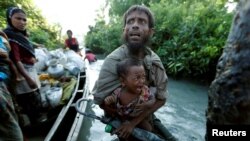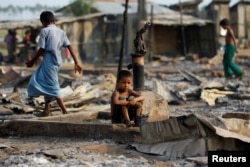Amnesty International says it has credible evidence implicating 13 Myanmar officials, including a top military commander, in crimes against humanity for their roles in the campaign against Rohingya Muslims that began in August.
Senior General Min Aung Hlaing, commander in chief of the Defense Services, and eight other senior officers, a junior officer and three Border Guard Police officers are cited in Amnesty's nearly 200-page report.
"Make absolutely no mistake, these are crimes against humanity. We are talking about rape, murder, torture, forced starvation, the use of land mines, and targeted large-scale burning of villages," said Amnesty's Crisis Response Director Tirana Hassan, at the launch of the report Monday."These are crimes which are so serious that they should be referred to the International Criminal Court."
More than 700,000 Rohingya have fled Myanmar's northern Rakhine state since August 25, after attacks by Rohingya militants against state security forces led to military reprisals. The United Nations says the military retaliated in a well-organized, systematic and coordinated manner, a "textbook example" of ethnic cleansing.
Shocking stories
Fleeing Rohingya have told harrowing accounts of the military burning their villages in northern Rakhine state, rape, killings, looting and the laying of land mines to prevent them returning to their homes.
Amnesty researchers conducted more than 400 interviews, including with Rohingya in central Rakhine state and in refugee camps in Bangladesh. They also collected victim and eyewitness testimony and analyzed satellite images and confidential documents.
"What we know from this is that the atrocities committed against the Rohingya implicate every level of the Myanmar military," said Matthew Wells, Amnesty's senior crisis adviser.
He said at least two of the units sent to deal with the Rohingya had been previously implicated in war crimes in northern Shan state.
"The senior levels of the military chose to deploy units that had a reputation for brutality against ethnic minorities, and the result was exactly that," Wells said.
The researchers also detail abuses by Rohingya militants of the Arakan Rohingya Salvation Army, or ARSA. The list includes at least two dozen targeted killings of Rohingya alleged to have been government informants, as well as deadly attacks on Hindu communities.
VOA's attempts to reach the Myanmar U.N. ambassador for comment on the report were unsuccessful.
Amnesty said a letter it sent to Myanmar's de facto head of state, Aung San Suu Kyi, was received in Napitaw on June 13, but there has not yet been any reply.
Commission of inquiry
After months of denying that atrocities were happening, Myanmar authorities recently established a commission of inquiry to investigate the situation, but Amnesty worries that it will "whitewash" the facts.
The rights group said that while it is aware of the delicate balance between the civilian government and the military, that does not absolve civilian leaders from doing more to resolve the crisis.
"The civilian government has a responsibility to address the root causes of this violence," Amnesty's Hassan said of Aung San Suu Kyi.
While Amnesty would like to see the U.N. Security Council use its authority to impose an arms embargo on Myanmar and refer these 13 individuals to the International Criminal Court at The Hague, it is unlikely to happen because China would most likely use its veto to block such a move.
"We certainly understand the challenges on the Security Council, but at the same time, that can't be an excuse for not trying to push this through," said Wells.





